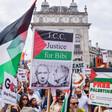Rights and Accountability 24 December 2012
Human Rights Watch, which maintained a conspicuous silence during Israel’s eight consecutive days of intensive bombing of Gaza last month, has issued a report unambiguously condemning Israel’s targeting of Gaza journalists during the November attacks.
The New York-based group investigated four Israeli attacks on journalists and media facilities in Gaza, finding that Israel “violated the laws of war by targeting civilians and civilian objects that were making no apparent contribution to Palestinian military operations.”
Toddler killed
Two media workers and a toddler were killed and ten members of the press were wounded in the four attacks, according to Human Rights Watch. The two-year-old boy who was killed, Abdelrahman Naim, lived across the street from one of the media towers which were targeted by Israel. His mother, Najal Naim, told Human Rights Watch:
Abdelrahman was playing here [in the living room]. I heard the missile hit the tower; all the glass in the apartment broke, and some of the pieces came in. Mohamed, my son, was playing with Abdelrahman and two nephews. A small piece of shrapnel hit his chest, and he died immediately. Blood came from his mouth and nose. He made no sound.
The two killed media workers, Mahmoud al-Kumi and Hussam Salama, cameramen for Hamas’ al-Aqsa TV, were extrajudicially executed on 20 November when an Israeli missile hit their car marked “TV” and “Press” in Gaza City. Both al-Kumi and Salama were young men aged 29 and 30, respectively, and were the fathers of several small children under the age of five.
Additionally, Khader al-Zahhar, a cameraman with al-Quds TV, lost his right leg when an Israeli missile struck the press building in which he was sleeping in the early hours of 18 November.
Israeli army and government spokespersons justified the attacks on journalists by stating that the media workers were military targets, a claim rejected by Human Rights Watch. Its investigation included detailed inspections of the targeted buildings and interviews with family members and colleagues of the slain journalists.
War crimes
Significantly, Human Rights Watch finds that “official statements that reflect the military having adopted an unlawful basis for attacks are evidence of war crimes because they show intent.”
Israeli army and government spokespersons attempted to justify the attacks on the media in interviews with Al Jazeera English, the Associated Press, on the Israeli army’s blog and in a statement published by The New York Times.
In its report and in the above short video, Human Rights Watch calls out Israeli government spokesperson Mark Regev for his baseless claims made on Al Jazeera English that targeted media buildings housed Hamas “communication facilities”:
Israeli government spokesman Mark Regev, when asked in a television interview about the attack on the Shawa and Housari Building, said that the IDF had targeted Hamas “communications facilities” on the roof and that no foreign journalists were hurt. When pressed about the seven wounded media workers on the floor below, he replied: “There is the al-Aqsa station, which is a station that is a Hamas command and control facility, just as in other totalitarian regimes the media is used by the regime for command and control and also for security purposes. From our point of view, that’s not a legitimate journalist.”
Regev and other Israeli officials provided no information to substantiate the claim that al-Aqsa TV or al-Quds TV were operating as command and control facilities in either of the high-rise buildings or elsewhere in Gaza.
Human Rights Watch also specifically scrutinized the justifications for attacking journalists made in multiple media outlets by Israeli army spokesperson Avital Leibovich:
During the November fighting, an IDF spokeswoman, Lt. Col. Avital Leibovich, told the media that the IDF [Israeli military] targeted “people who have relevance to terror activity.” She further sought to justify attacks on media by writing that Hamas’s al-Aqsa TV and a radio station called al-Quds Educational Radio, which has ties with Islamic Jihad, are “intricately linked with Islamic Jihad and Hamas and have encouraged and lauded acts of terror against Israeli civilians for the past decade.” She continued: “Such terrorists, who hold cameras and notebooks in their hands, are no different from their colleagues who fire rockets aimed at Israeli cities and cannot enjoy the rights and protection afforded to legitimate journalists.”
Regev, the Israeli government spokesman, said that those working for Hamas media cannot be considered journalists: “They are an integral part of the Hamas structure and no one can deny that fact.” He added: “All those involved in targeting Israeli civilians directly or indirectly should not feel that they have impunity.”
“Israeli officials have dangerously and unlawfully blurred the distinction between civilians who call for or support military attacks and those who directly participate in attacks,” [Human Rights Watch’s Middle East director Sarah Leah] Whitson said. “This claimed justification for attacking civilians opens the door to war crimes.”
The press safety watchdog Committee to Protect Journalists has also criticized baseless claims made by Israeli spokespersons to justify the deadly targeting of media workers in Gaza.






Comments
See also:
Permalink Eric replied on
See also:
http://ifex.org/palestine/2012...
http://www.madacenter.org/repo...
http://www.madacenter.org/repo...
http://ifex.org/palestine/2012...